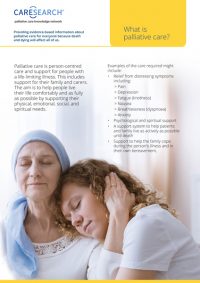For many people, being referred to palliative care brings up a lot of thoughts and emotions. There are also many misconceptions about palliative care. We dispel some of the more common myths below:
Myth 1: Palliative care hastens death, it is the beginning of the end.
Palliative care intends neither to hasten or postpone death. It is instead focused on the prevention of worsening symptoms and alleviating suffering. Palliative care aims to help you live as well as you can, for as long as you can. Palliative care affirms life while recognising that dying is an inevitable part of life.
Myth 2: Palliative care is only available when you are in your last few days of dying.
Palliative care is not just for when a person is close to death. It can be provided at any time, depending on a person’s needs, even from diagnosis. Palliative care can be given alongside other treatments or when other treatments have ended. Some people access palliative care on and off through various stages of an illness.
Myth 3: You can only receive palliative care in a hospital.
Palliative care may be provided in hospitals or the community setting, including at home.
Myth 4: Palliative care means my doctor has given up and there is no hope for me.
The aim of palliative care is to help people live their life comfortably and as fully as possible by supporting your physical, emotional, social, and spiritual needs. Palliative care aims to enhance and optimise quality of life when time is limited.
 Care Search – What is palliative care?
Care Search – What is palliative care?
Care Search is a palliative care knowledge network, and they provide evidence-based information about palliative care for everyone because death and dying will affect us all. To find out more about palliative care please read the “What is palliative care?” factsheet.
Metro North Palliative Care
Metro North Palliative Care Service provides specialist support for patients with a life-limiting diagnosis and their family and supports. They provide specialist support to anticipate, prevent or relieve suffering associated with complex physical, psychosocial, or spiritual symptoms to enable a dignified and peaceful death in your location of choice.
